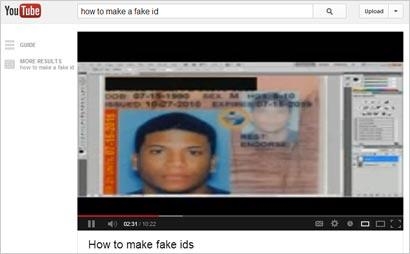Attorney General Want Stricter YouTube Video Ad, Content Guidelines
- by Laurie Sullivan @lauriesullivan, July 5, 2013
 The office of
the Attorney General has put pressure on Google to monitor more closely the video ads and content uploaded to YouTube -- especially those advertising pharmacies selling counterfeit goods or Oxycontin
and other medication without a prescription.
The office of
the Attorney General has put pressure on Google to monitor more closely the video ads and content uploaded to YouTube -- especially those advertising pharmacies selling counterfeit goods or Oxycontin
and other medication without a prescription. Nebraska Attorney General Jon Bruning and Oklahoma Attorney General Scott Pruitt believe Google profits from teaching people how to conduct illegal activities. The two wrote a letter to Google calling on the company to stop allowing people to upload videos on YouTube that explains how to construct bombs, buy drugs without a prescription, make fake IDs or passports, and promote the sale of counterfeit merchandise.
The Bruning and Pruitt letter refers to the videos as a means for Google to garner "advertising revenue" through content that promotes dangerous or illegal activates. While Bruning and Pruitt understand that Google created YouTube as an open platform and cannot police all content, the letter expresses "the fact that Google actively seeks to profit from the posting of these types of videos on YouTube, a Web site known to be particularly popular among children and teens, is very troubling."
Bruning and Pruitt asked Google to provide the number of videos removed between January 2011 and June 2013 for violating YouTube policies that prohibit the posting of illegal and objectionable content.
Google updated its posting guidelines to include "appropriate" ads, but it also states its YouTube privacy policy "does not cover the information practices of other companies and organizations who advertise our services, and who may use cookies, pixel tags and other technologies to serve and offer relevant ads."
Google was fined $500 million in 2011, for allowing Canadian pharmacies to place ads illegally selling prescription drugs to U.S. consumers. Then hackers fought back in the best way they know by injecting code to hijack searches to sites promoting drugs preventing hair loss and more.
In June, Google Legal Director Adam Barea wrote in a blog post how Google has "worked closely with a number of organizations, government agencies, and businesses to combat rogue online pharmacies from all angles." That post refers to illegal pharmaceutical companies. The letter to Google from Bruning and Pruitt addresses a wider problem of bomb making and counterfeit goods, which these days include drugs.



Surely you mean "Attorneys General Want Stricter YouTube Video Ad, Content Guidelines" in the headline and other references in the body of the article.
I'm seeing a lot of questionable content, not from an appropriateness level, but more from a click-fraud revenue-sharing perspective. Crooks upload junk videos about anything and then employ others to click ads served alongside the videos... so advertisers needs to analyze their AdWords data closely and be suspect of any campaigns or videos that have one click and one conversion (100% conversion rate). That's likely click fraud.